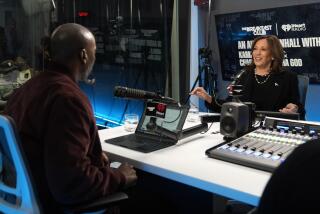Cultivating Jackson Backers : Dukakis Making Bid for Black Support
- Share via
CLEVELAND — With an eye toward the general election campaign, Michael S. Dukakis made a low-key appeal for support Saturday to a group of blacks whose members described themselves as solid backers of his rival for the Democratic presidential nomination, the Rev. Jesse Jackson.
The Massachusetts governor borrowed a pitch from Jackson, noting that the Reagan Administration once employed Panamanian strongman Manuel A. Noriega despite evidence that he was running drugs. “We’ve got an Administration that can’t say no to drugs and can’t say no to drug peddlers,” he said. “What kind of message is that to send to young people?”
Dukakis was well received at the luncheon of the United Black Fund, which raises money for charitable activities. The audience reaction provided some evidence that Jackson’s increasingly harsh remarks about Dukakis’ positions may not affect Dukakis’ support among blacks in the general election.
Jackson Partisan’s View
Although Jackson partisans challenged suggestions that their candidate cannot overcome Dukakis’ lead in Democratic National Convention delegates, George Forbes, the Cleveland City Council president, a leader in the black political community and a Jackson supporter, said Saturday that in the autumn campaign, “we’ll go with Dukakis.”
His assessment was echoed by another guest at the luncheon, Linda Perez. She said that Jackson supporters, seeking to elect “anybody but (Vice President George) Bush,” would be willing to support Dukakis as the Democratic nominee, but that first, “there would have to be some message from Jesse” signaling his approval.
Jackson, seeking to erode Dukakis’ lead by making good showings Tuesday in the Ohio, Indiana and District of Columbia primaries, on Saturday continued to criticize Dukakis, but without mentioning his name.
“What must leaders have? A resume or a following?” Jackson demanded at a labor rally in Cleveland. “If you want a record of fighting for change, I have that record.”
Two Parties Needed
“Democrats must be the alternative to the Republicans. We do not need two Republican parties in this country,” he said.
When reporters asked him to explain his remarks, Jackson said: “The point is there are forces in our party who, in their state of caution, would try to move us to the right.”
While this appeared to be an oblique reference to Dukakis, Jackson later said: “I would not put him in that category.”
But at a later rally in Dayton, Jackson took an indirect jab at Dukakis’ record as a manager, which is considered one of his greatest political assets. “Leaders need managers, and they hire them,” Jackson said.
Jackson’s criticisms over the past few days seem to have energized his black supporters without seriously undermining Dukakis’ image.
Vivian McGlothin stood in an icy drizzle Friday in Cleveland with her 6-year-old daughter, Kristie, to catch a glimpse of Jackson, but she said she understood that his chance of making it all the way to the White House was slim. “Yeah, I’ll still vote for Dukakis” in November, she said.
‘Keep on Trying’
Cheryl Riley, a nurse who heard Jackson speak in Cincinnati, had no doubt what she will do if Jackson is not the nominee. “If not, he’s made history. If not, we’ll keep on trying! If Jesse doesn’t make it, the black people are going to be out there voting anyway,” she said.
Robert Fikes, 38, who works for the Cincinnati housing authority, was holding a Jackson placard at the same rally. “I like Jackson, I like Dukakis,” Fikes said. “I think we should support some Democrat.”
Throughout the day Saturday, Jackson and Dukakis were mining the same vein. Both addressed the labor rally in Cleveland and both were scheduled to address a Democratic Party dinner in Indianapolis.
Dukakis, meanwhile, continued to steer clear of any direct attack on Jackson.
Dukakis opened his remarks to the United Black Forum with a line more often placed deep in his text. When featured prominently as it was Saturday, it served to link him to Jackson:
Who would have thought at the start of the primary campaign, he asked, that the race for the Democratic presidential nomination would come down to a choice between the “son of Greek immigrants and a black man who grew up poor in South Carolina?”
More to Read
Get the L.A. Times Politics newsletter
Deeply reported insights into legislation, politics and policy from Sacramento, Washington and beyond. In your inbox twice per week.
You may occasionally receive promotional content from the Los Angeles Times.









